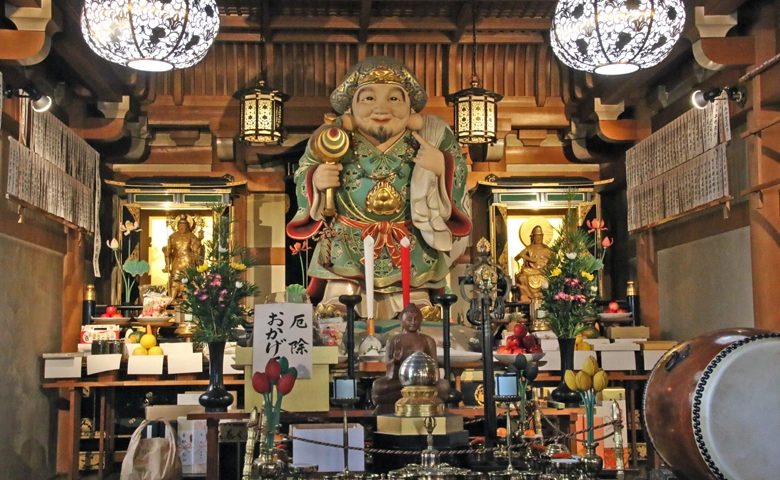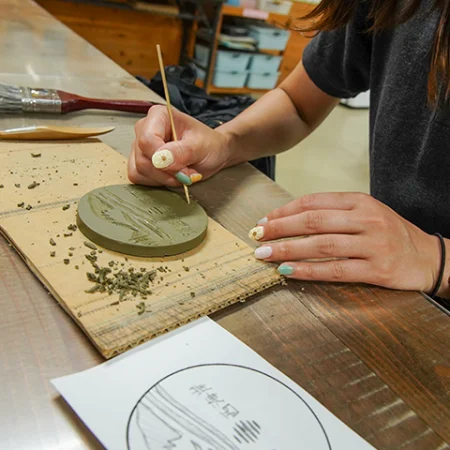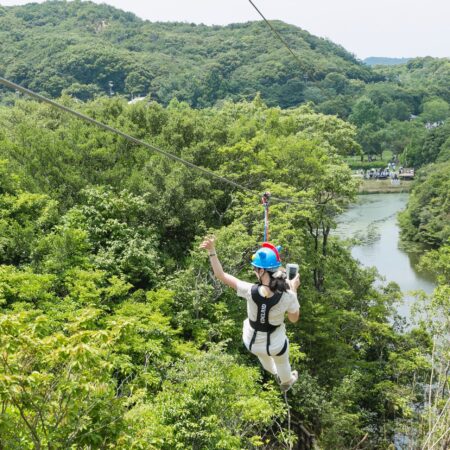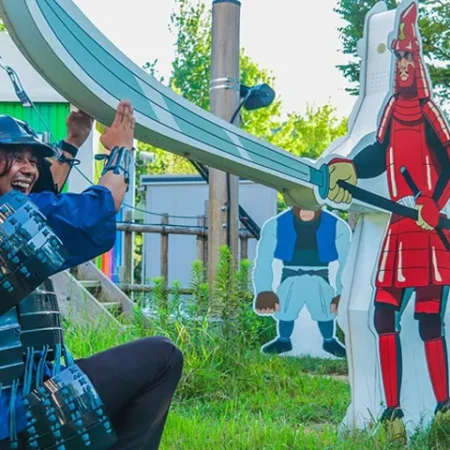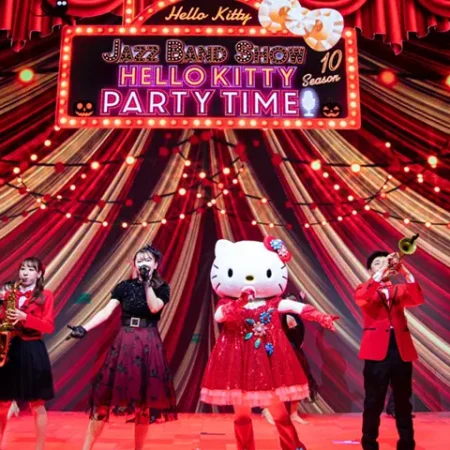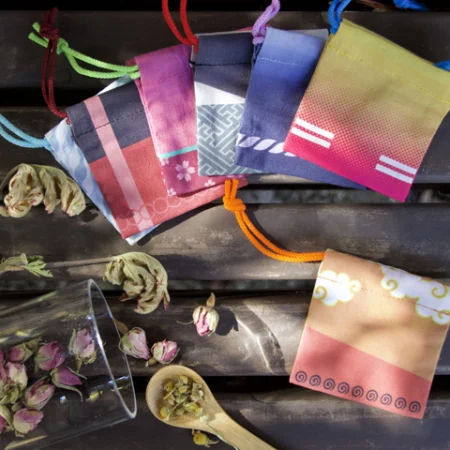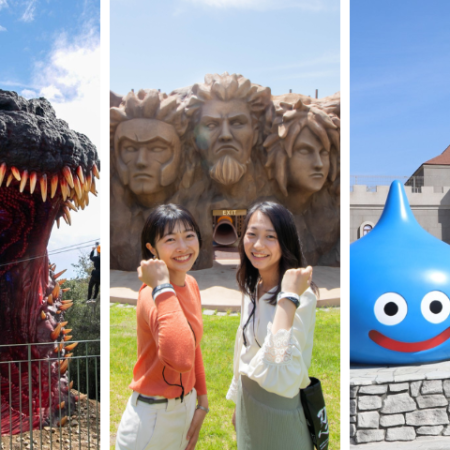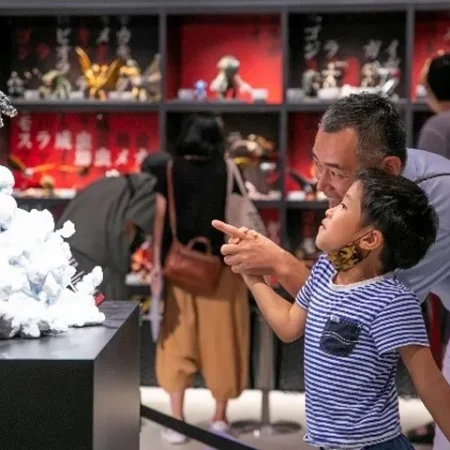Japan’s spiritual and cultural traditions are rich with symbolism and stories; among them, the Seven Lucky Gods, known as “Shichifukujin” (七福神), hold a special place. While their presence is celebrated across Japan, Awaji Island offers a unique and profound connection to these revered figures. Let’s explore the fascinating historical tale of Shichifukujin in more detail.
Table of Contents
About the Seven Lucky Gods in Japan
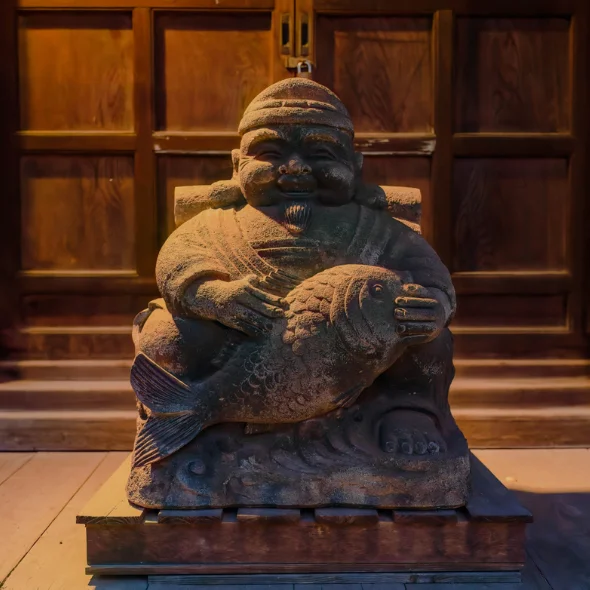
The Seven Lucky Gods are a group of deities from various cultural and religious backgrounds, Shintoism, Buddhism, Taoism, and Hinduism—each representing different aspects of good fortune. The seven deities are:
Ebisu (恵比須) – The god of luck and wealth, particularly in fishing and commerce. He is often depicted holding a fishing rod and a large fish, symbolizing prosperity.
Daikokuten (大黒天) – The god of wealth, fortune, and farmers. Recognized by his mallet and sack of treasures, Daikokuten is also associated with food and farming.
Bishamonten (毘沙門天) – The god of warriors and the protector of Buddhist law. He is depicted in armor, carrying a spear, and is known for bringing fortune in battles and protecting against evil.
Benzaiten (弁財天) – The goddess of knowledge and art. Benzaiten is often shown playing a musical instrument, symbolizing the harmony and flow of life.
Fukurokuju (福禄寿) – The god of longevity, wealth, and happiness. He is recognizable by his long forehead and is often accompanied by a crane or tortoise, symbols of long life.
Jurojin (寿老人) – A deity of longevity, Jurojin is associated with wisdom and a happy life. He is often depicted with a long beard and cane, accompanied by a deer.
Hotei (布袋) – The god of contentment and happiness, often known as the laughing Buddha.
Hotei is usually depicted as a large figure with a big belly, carrying a sack full of treasures.
The Influence of Shichifukujin on Japanese Popular Culture

In modern Japan, the influence of the Seven Lucky Gods extends beyond traditional religious practices. They are frequently depicted in anime, manga, and various forms of entertainment, often portrayed in a manner that blends humor with reverence.
These gods are also popular motifs in contemporary design, appearing on everything from household items to fashion accessories. Their presence in everyday life reflects how deeply ingrained these figures are in the Japanese collective consciousness, bridging the ancient and the modern in a way that continues to resonate with people of all ages.
You might have heard of Yebisu Beer, which takes its name and inspiration from the god Ebisu. First brewed in 1890 by the Japan Beer Brewery Company, now part of Sapporo Breweries, Yebisu Beer was named after this beloved deity to symbolize good fortune and prosperity.

On Awaji Island, Shichifukujin Craft Beer and Senbei are very popular. A series of Shichifukujin Craft Beer has a label depicting each of seven Gods. Two of them, Meister with the Jurojin label and Smoked with the Bishamonten label won a bronze award at an International Beer Competition. Another one, Weizen with the Benzaiten label won a silver award at the same competion.
Shichifukujin Onion Senbei is using a famous Awaji Onion popular for its sweetness as an ingredients. Both of these products are available at a Nojima Marche located at Nojima Scuola.
For other Shichifukujin and unique products on Awaji Island.
| Name | Nojima Scuola |
|---|---|
| Adress | 843 Nojimahikinoura, Awaji City, Hyogo Pref. 656-1721 A free shuttle bus is available. |
| Website | https://www.nojima-scuola.com/ |
| Reservations | https://www.tablecheck.com/en/shops/nojima-scuola/reserve |
| Tel | 0799-82-1820 |
| Operation Hours | 1F Marché /Bakery: Weekdays 10:30~19:00 Sat., Sun., & Public Holidays 10:00~19:00 1F Café Scuola: Weekdays Lunch 11:00~14:00/ café 14:00~18:00 Sat., Sun., & Public Holidays breakfast 10:00~11:00 Lunch 11:00~15:00 Café 15:00~18:00 2F Ristorante Scuola: 11:30~15:30 (in by 14:00) / 18:00~21:30 (in by 19:30) Outdoor Zoo: Weekdays 11:00~16:00 Sat., Sun. & Public Holidays 10:00~16:00 (13:00~14:00 animals in recess) Closed: Wednesdays (Open on Public Holidays) |
Click here for details of Nojima Scuola
Shichifukujin Meguri on Awaji Island, the Birthplace of Japan
Awaji Island, located in Hyogo Prefecture, is deeply connected to Japan’s mythology and spirituality. The island is believed to be the birthplace of Japan in Shinto mythology, and its spiritual heritage extends to the reverence of the Seven Lucky Gods.
In addition to products themed on these gods, one of the popular activities on Awaji Island is a visit to locations where these deities are celebrated, a journey called “Shichifukujin Meguri” (七福神巡り), or “Pilgrimage of the Seven Lucky Gods”. This spiritual journey occurs across several temples and shrines dedicated to each of the Seven Lucky Gods, offering visitors a chance to pray for blessings and good fortune.
On Awaji Island, this pilgrimage is a popular activity, blending spiritual practice with the island’s natural beauty.
Awaji Island Seven Lucky Gods Pilgrimage
Visitors to Awaji Island can join on a pilgrimage that spans multiple temples and shrines, each dedicated to one of the Seven Lucky Gods. This journey is not just a spiritual one but also a cultural exploration of the island’s rich history.
Some of the notable sites include: Gokokuji Temple (representing Hotei), Kakujuji Temple (representing Bishamonten), Chizenji Temple (representing Benzaiten), and Manpukuji Temple (representing Ebisu).
Shichifukujin Pilgrimage is a way to connect with the island’s ancient traditions and gain a deeper understanding of Japan’s cultural fabric. For those seeking blessings of fortune, happiness, and prosperity, or simply looking for a spiritual retreat, Awaji Island provides an ideal setting for it.
Closing
The Seven Lucky Gods are a testament to Japan’s diverse religious and cultural heritage, and their connection to Awaji Island adds another layer of depth to this already fascinating destination. Whether you’re a spiritual seeker or a cultural enthusiast, a pilgrimage to the Seven Lucky Gods on Awaji Island offers a meaningful and enriching experience that combines the best of Japan’s traditions and natural beauty.



